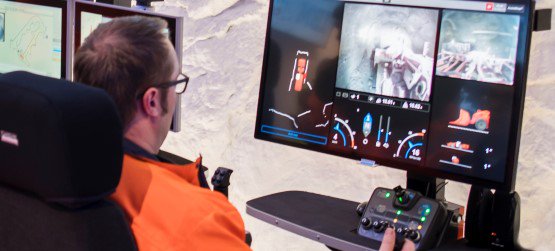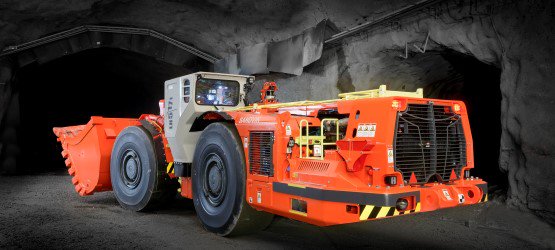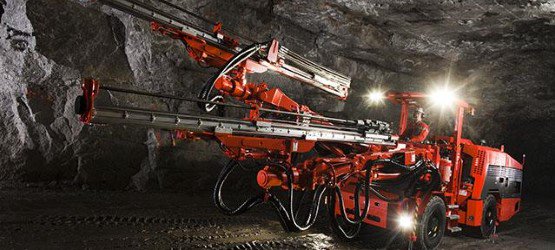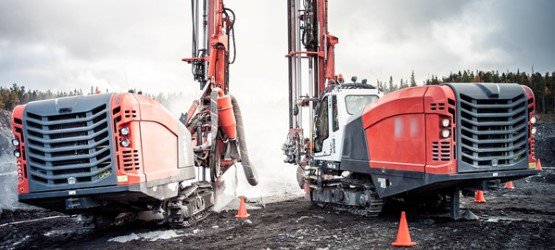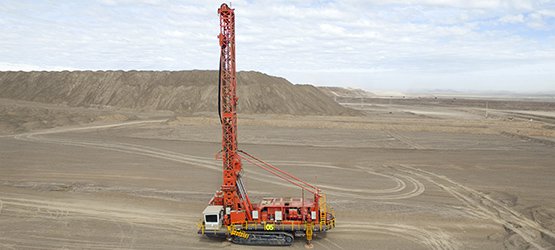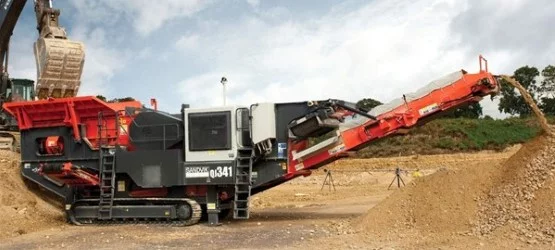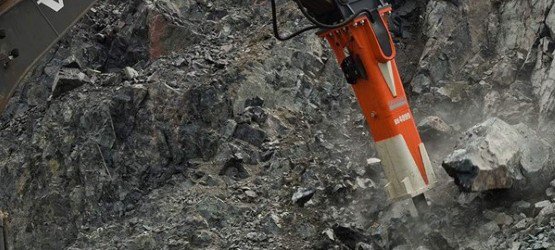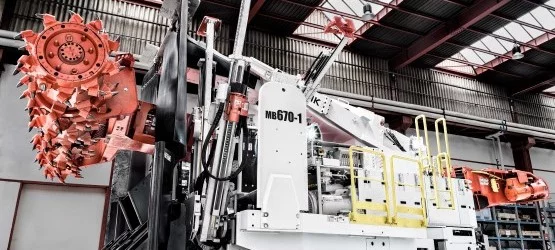oct trituración y Meulage de pierre de almendras POUR L’EXPLOITATION MINIÈRE ET L’EXCAVATION DE ROCHE
Notre offre produits propose des solutions pour presque tous types de projets d'exploitation minière et d'excavation de roche. Notre gamme d’équipements et de services pour l'exploitation minière et l'excavation de roche est étudiée afin de maximiser votre productivité et votre rentabilité. Notre expertise se fonde sur des décennies de collaboration avec nos clients et tous nos produits bénéficient de notre réseau mondial pour la fourniture de maintenance sur site, de formation et d’un soutien 24 h/24. N’hésitez pas à Nous contacter pour tout conseil sur le choix d’un produit ou pour un besoin d’assistance technique.
- technique de plaques de poudre de plante Irlande
- sable de silice apres est extrait
- marteau concasseur pengeluar
- machines de carrières de granit en Sierra Leone concasseur afrique du sud
- broyeur Indonésie bol pulvérisateurs de charbon brut
- machine à broyer en Egypte
- concassage et de broyage des équipements à petite échelle
- concasseur Indonésie percussion applicabilité
- le minerai de cuivre traitement de concentr
- de mas concasseur de quartz pour obtenir de l'or en vente
- concasseur de pierre machine portative
- exploitation minière a petite concasseur a vendre
- pierre machine de l'usine de rupture de concasseur disponible en inde
- Machine à meuler raunding
- statistiques de granit de concassage
broyeur de pierres grossiste

Exploitation industrielle de granite et problèmes
5 天之前 L’exploitation industrielle de granite a engendré des problèmes environnementaux notamment l’émission de poussière dans l’atmosphère, les gaz et les odeurs, les bruits, la pollution des eaux de surface, la pollution sonore et l’ensablement des vallées.
Read More

Pierre concassée de granit (41 photos): 5-20 mm, 40-70 mm
La pierre concassée de granit est le type de matériau de construction le plus courant, elle est obtenue à partir de roche volcanique, qui a une résistance accrue et une structure
Read More

Influence du taux et de la classe granulaire des
2 天之前 L’amélioration de la granulométrie de la latérite au concassé de granite de classe 0/31.5 à un taux de 25% avec une énergie de compactage à 98% de l’OPM a donc été
Read More

fr/statistiques de granit de concassage.md at main hongyib/fr
Contribute to hongyib/fr development by creating an account on GitHub.
Read More

CONCASSES DE GRANITE SUR LA MISE EN ŒUVRE DE
2018.2.2 L’amélioration de la granulométrie de la latérite au concassé de granite de classe 5/25 à un taux de 20% avec une énergie de compactage à 98% de l’OPM a donc
Read More

Pierre concassée et agrégats - Polycor Inc.
À titre de fournisseurs de pierre concassée, nous offrons des agrégats de pierre fabriqués à partir de granite naturel issu de nos vastes carrières de pierre de taille. Nous utilisons
Read More

Guide de prix 2023 des pierres concassées - Groupe Bellemare
2023.1.13 La pierre concassée est un agrégat fréquemment utilisé pour divers travaux de construction. Son aspect angulaire lui permet de tenir en place facilement et
Read More

Analyse de la taille et de la part du marché des équipements de ...
Le marché mondial des équipements de concassage de pierres était évalué à 5,55 milliards de dollars en 2021 et devrait dépasser une valorisation nette de 8,45 milliards de dollars
Read More

Concassage de matériaux pour carrière à Oloron-Sainte
Société Laborde, à Oloron-Sainte-Marie, répond à tous vos besoins de matériaux de construction grâce au procédé de concassage. Réalisé mécaniquement à l’aide d’un concasseur, ce procédé consiste à placer les granulats entre deux plaques métalliques, qui les écrasent. Cela nous permet de vous proposer différents produits.
Read More

Unité complète de concassage à pierre granite
Concasseur à cône série CS est utilisé pour pierre dur, tel que le granite, le marbre, le calcaire, le béton, etc. Kefid produit quatre principaux types de concasseur à cône : le standard ou concassage gros, le type fin ou
Read More

Les carrières et sociétés de concassage de Côte d’Ivoire
AMG ABIDJAN SARL. Carrière - Concassage. M’Brago 2, PK34, Autoroute du Nord. Abidjan - Côte d’Ivoire. Tel: (+225) 27 20 24 42 27. Fiche. Site web. La Carrière AMG ABIDJAN SARL est une filiale du groupe AMG PARTNERS dont le Siège Social est à Beyrouth au Liban. Fondé en 1998 par deux (2) membres de familles de carriers depuis trois ...
Read More

statistiques de carriere de pierre de concassage en afrique
2024.4.23 251 4- Incidences socio-économiques du concassage de granite Le concassage de pierre apporte une plus-value aux concasseurs. Mais il est aussi une source de maladie. 4-1- Apport financier et répartition des revenus de concassage de pierre à Dassa-Zoumè Le concassage de pierre génère de revenus substantiels aux exploitants ...
Read More

Concasseur à Mâchoires Constmach
Concasseur à Mâchoire. Les CONCASSEURS À MÂCHOIRES CONSTMACH sont conçus pour être en mesure de gérer le processus de concassage initial de tout type de matériau, du calcaire le plus tendre au granit le plus dur. Les concasseurs à mâchoires CONSTMACH sont utilisés comme concasseurs de première étape dans nos installations de ...
Read More

Concassage de granite à Parakou : Entre survie et risques
2023.11.14 Ces concasseurs de granite demandent le soutien des autorités de la mairie de Parakou, afin que leur soient mis à disposition des matériaux de protection adaptés à leur activité. Le gouvernement quant-à-lui, devra intensifier et étendre ses actions sociales au profit de cette couche vulnérable de citoyens, afin que celle-ci bénéficie ...
Read More

CMR Granit Côte d'Ivoire LinkedIn
CMR Granit est un nouvel entrant dans le secteur des carriers de la région d’Abidjan qui est épaulé par un leader mondial de la construction et l’entretien d’infrastructures de transport présent sur le continent africain depuis 80 ans. Fort de son site d’exploitation situé au PK 38 à la sortie Nord d’Abidjan, les activités de CMR Granit sont principalement l’extraction, le ...
Read More

SISAG (SOCIETE IVOIRO-SUISSE ABIDJANAISE DE GRANITE)
La SISAG est spécialisée dans l'exploitation et le développement des carrières de concassage des produits pour la construction et les routes. Outre sa longévité au sein du territoire ivoirien, la SISAG se distingue incontestablement en tant que locomotive de ce secteur. Dès lors, elle assume la gestion, la mise en valeur et le perfectionnement de la
Read More

Tout savoir sur les concasseurs Hellopro
Les concasseurs à percussion. Appelés aussi concasseurs à marteau ou concasseurs à rotor centrifuge, les concasseurs à percussion incorporent deux éléments principaux : Un rotor muni de barres de frappement. Des écrans de choc. Le fonctionnement d un concasseur à percussion repose surtout sur le principe de réduction par chocs.
Read More

Pierre concassée de granit (41 photos): 5-20 mm, 40-70 mm
Des batteurs (omoplates) y sont attachés. Le granit entrant dans la machine de concassage coupe les plaques d'impact et les unes dans les autres. Le fonctionnement des équipements rotatifs se distingue par un niveau élevé de sélectivité - c'est-à-dire que la majorité des pierres de granit sont en forme de cube (80 - 85%).
Read More

SISAG (SOCIETE IVOIRO-SUISSE ABIDJANAISE DE GRANITE)
SISAG (SOCIETE IVOIRO-SUISSE ABIDJANAISE DE GRANITE) Carrière - Concassage. 3 608 vues Cette entreprise vous appartient ? Coordonnées. Direction: non loin de MACACI - Williamsville Adjamé - 01 BP 1231 Abidjan 01 Abidjan - Côte d’Ivoire sisagci ...
Read More

Exploitation industrielle de granite et problèmes
2024.7.12 Introduction. L’exploitation du granite présente des risques sur l’environnement et sur la société (K. A. KOUAME, A. P. AYEMOU et K. G. N’GUESSAN, 2017, p. 1).En 2017, l’on a recensé neuf (09)
Read More

Tout savoir sur les machines de broyages et de concassage
2021.5.21 Il réalise du concassage grossier et du pré-broyage. Vous pouvez y traiter différents matériaux tels les roches, le granit, le béton recyclé et les minerais. Ces matériaux sont broyés entre deux mâchoires pour obtenir des particules fines. On peut alors obtenir des particules d’une épaisseur 150 mm à la sortie.
Read More

Planifier votre entreprise de concassage : un guide complet
3 天之前 Concevoir un processus de concassage efficace basé sur la dureté, la taille et l'utilisation prévue de la pierre. Cela comprend généralement les étapes de concassage primaire, intermédiaire et tertiaire. Disposez l’équipement dans une configuration raisonnable, en tenant compte du transport et du stockage des pierres.
Read More

Nouvelle méthode de concassage et de broyage du granit
2023.4.23 L'approche innovante de concassage et de broyage du granit consiste à réduire la pierre dure en petits fragments à l'aide d'équipements et de procédures spécifiques.. Cette méthode est plus efficace et efficiente que les procédures traditionnelles, résultant en des résultats plus rapides et plus précis.
Read More

Bien choisir un concasseur - Guides d'achat DirectIndustry
Bien choisir un concasseur. Un concasseur est une machine de broyage qui utilise l’énergie mécanique pour briser des blocs de pierre, de béton, ou d’autres matériaux de construction, en blocs plus petits de granulométrie déterminée. Ils sont notamment utilisés dans l’industrie minière pour réduire la taille des blocs de minerai ...
Read More

Les différents types de concasseurs suivant vos besoins
2021.9.24 Vous trouverez dans cet article ces différents types de concasseurs. Les concasseurs à mâchoire. Le concasseur à mâchoire est un concasseur primaire. Son rôle principal est de réduire les matériaux en très petite taille pour que ces derniers puissent être acheminés, par les broyeurs, à l’étape de concassage suivante.
Read More

Le concassage et le criblage des matériaux déchets de chantier
2012.3.21 Les entreprises du BTP et de la démolition font très souvent appel à des prestataires spécialisés dans le concassage et le criblage mobile pour mettre à dimension la granulométrie des matériaux. Le concassage consiste à éclater, écraser ou broyer des matériaux, comme le béton armé, les matériaux de voirie, le granit ou le basalte afin de
Read More

Machine de broyeur de granit - Haute efficacité et bonne
Ici, je vais vous présenter deux types de concasseurs à mâchoires en granit AIMIX, APJ-E et APJ-V. Le concasseur à mâchoires de granit est très approprié pour le concassage primaire, parmi lesquels le APJ-E adopte une cavité de concassage en forme de semi-V et la plage de décharge est ajustée par des joints L’ Concasseur à ...
Read More

Les carrières et sociétés de concassage du Bénin - Go Africa
GROUPE PREMIUM BENIN. Carrière - Concassage. Qt GBENA, parcelle H du lot 515 PH4150/MCOT, 7ème arrondissement. Saint Michel. Cotonou - Bénin. Tel: (+229) 55 69 55 59. Fiche. Site web. GROUPE PREMIUM BENIN est spécialisé dans la distribution des équipements et matériels de BTP, MINES ET CARRIÈRE,INDUSTRIE.
Read More

Les carrières et sociétés de concassage du Togo - Go Africa
Carrière - Concassage. Dans l’enceinte de CIMTOGO. Zone Portuaire - BP 6262. Lomé - Togo. Tel: (+228) 22 70 06 83. Fiche. Itinéraire. GRANUTOGO est une société de concassage d’agrégats spécialisée dans la vente de sable de granite et de graviers concassés. Filiale de Scancem International, membre de HeidelbergCement group, elle a ...
Read More

[Carrière de... - SOGECAR - Société de Gestion des Carrières
Nos graviers de qualité assurent solidité et pérennité à vos constructions. (+225) 27 22 51 40 15 - 07 58 09 30 35 - 07 78 11 14 47. contact@sogecar.ci. sogecar.ci. Nos carrières: Carrière d'Abakro, axe Yamoussoukro - Oumé. Carrière de Bouaké, route de Diabo. #construction #BTP #geniecivil #chantier #roche #granite #concassage # ...
Read More

fr/43/procédé de concassage du granit.md at main hongyib/fr
9 févr 2010,granit carrière agréée par le Maître d'Oeuvre L'Entrepreneur dispose d'un délai de 15 jours après la notification du marché pour indiquer,L'indice de concassage sera de 100 Le rapport de concassage sera RC égal ou supérieur à 2,reconnaissance et définition du tracé avec le Maître d'Oeuvre.Contact FournisseurOptimisation Du Procédé De
Read More

Béton Barrette inc. Usines mobiles de concassage
Équipements pour concassage. Béton Barrette adapte sa technologie aux besoins de l’industrie. Nous offrons des services fiables, de qualité, conformes aux spécifications de notre clientèle. Nos usines mobiles se déplacent dans les carrières ainsi que sur les sites miniers du Québec pour transformer la matière première.
Read More

: cas des carrières de concassage de roches en moellons
2023.7.24 és aux projets et à la proposition des mesures de prévention de ces risques.Cette communication vise à présenter les risques rencontrés sur les carrières de concassage de roches pour la production de moellons et de graviers concassés, notamment les risques naturels, les risques liés aux incendies et explosions, les risques liés à la ...
Read More

Concasseur à mâchoires - Concasseur à Mâchoires à Vendre
Les machines de concasseur à roches à mâchoires sont un composant important des installations de concassage et de criblage. Les prix de ces machines peuvent varier selon les caractéristiques technologiques et la capacité de la machine. Un concasseur à mâchoires mobile est une option polyvalente qui offre l’avantage de la mobilité.
Read More

Exploitation de carrières Procédés et équipement - Epiroc
5 天之前 L’exploitation de carrières vise principalement à produire des matériaux de construction et de bâtiment comme des blocs de pierre ou de la roche concassée pour les granulats ou pour les matières premières de procédés comme la fabrication de ciment. En règle générale, on recourt à l’exploitation de carrières lorsqu’aucun ...
Read More

Stations de Concassage et Criblage - MEKA Concasseur, Cribles
La technologie de concassage et de criblage MEKA est destinée à toutes les industries impliquées dans la réduction des roches et des minéraux, répondant à vos besoins spécifiques, des concasseurs simples aux installations de concassage mobiles et aux installations complètes de traitement des roches, le tout soutenu par un service après
Read More

statistiques des concasseurs de granit vs statistiques des
unité de concassage à mâchoire CJC-60. stationnaire primaire haute capacité. Capacité: 100 t/h - 1 t/h. Puissance moteur: 300 kW - 200 kW. Poids: min 6000.0 kg. En tant que premier fabricant de concasseurs à mâchoires en Turquie, nous vous offrons un service de qualité avec un concasseur à mâchoires.
Read More

GRANUTOGO Togo : Carrière, Concassage, Lomé - Go Africa
Dans l’enceinte de CIMTOGO. Zone Portuaire - BP 6262. Lomé - Togo. (+228) 22 70 06 83. (+228) 99 90 00 03. GRANUTOGO est une société de concassage d’agrégats spécialisée dans la vente de sable de granite et de graviers concassés. Filiale de Scancem International, membre de HeidelbergCement group, elle a démarré ses activités en ...
Read More


